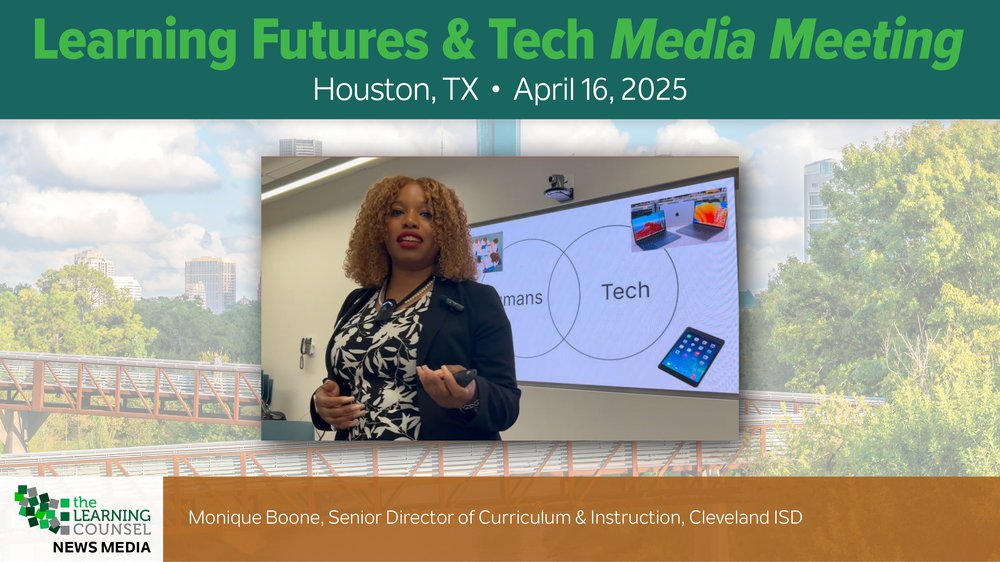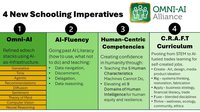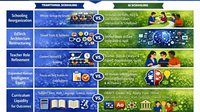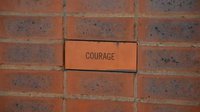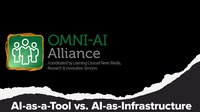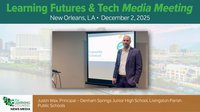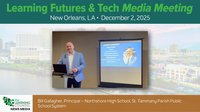At the Learning Counsel’s Learning Futures & Tech Media Meeting in Houston, Monique Boone, Senior Director of Curriculum & Instruction at Cleveland Independent School District, delivered a compelling and heartfelt talk that blended a deep understanding of instructional leadership with an urgent call to humanize innovation in education.
Boone’s presentation was a personal journey, an instructional strategy session, and a cultural reflection all wrapped into one. With humor, humility, and purpose, she walked the audience through her rise from classroom teacher to a district leader, and her evolving understanding of how technology must serve—not overshadow—students and educators.
Boone began by reflecting on her roots: “We were one of the first schools to have one-to-one devices,” she recalled. That early exposure led to a pivotal call from her former supervisor inviting her to become a digital learning coach. “I was already doing the work in my classroom,” she said, “and from there, it just sparked something.”
From digital learning coach to instructional technology specialist, and eventually content specialist and curriculum coordinator, Boone’s journey was driven by a passion for learning. She now oversees an expansive portfolio as Senior Director of Curriculum & Instruction (C&I), encompassing the core four, multilingual services, digital learning, and post-secondary education.
And yes—it’s a lot. “Some of y’all are probably thinking, ‘Oh my gosh, that’s a lot of work,’” she admitted. “And it is. But what I love about it is that we get to work seamlessly, in tandem.”
Too often, Boone noted, departments like curriculum, multilingual services, and digital learning operate in isolation. “You’ve seen it before—core four in one place, multilingual in another, and digital learning floating in the middle like hopscotch.”
Having experienced that disconnect firsthand as a digital learning coach, Boone is now working to end that cycle. “Post-COVID, we’ve realized that digital learning isn’t dessert—it’s not the thing on the side,” she said. “It needs to be locked in with instruction.”
In Cleveland ISD, her team is working to bring that cohesion to life. Rather than competing priorities at the campus level, they aim to present a unified district vision. “When we walk into a school, we don’t want it to be, ‘Oh, digital learning is focusing on this, multilingual is doing that, and C&I has their own goals,’” she said. “We want to say: this is our collective focus, and we’re going full force.”
Perhaps the most resonant theme of Boone’s presentation was the importance of staying human in a time of rapid technological change. She posed a poignant question: “How do we stay human in a space that is highly innovative?”
It’s a balancing act she sees daily in Cleveland ISD. The district serves a unique population with a high number of emergent bilingual (EB) students—many of whom are recent arrivals from Central and South America. Some, she said, “have not been in school for years.” In Cleveland, it’s not uncommon for a 15-year-old to enter school with the educational level of a second grader.
“That becomes a real barrier,” Boone acknowledged. “So it’s crucial we streamline everything—to make sure our kids are getting what they need to the best of our ability.”
Boone is also a parent. Her 16-year-old son juggles dual credit courses, athletics, and a part-time job. “I fuss at him all the time,” she laughed. “‘You better pass that course!’ And I think—if I was a kid, my head would explode.”
Her point was clear: While we press forward with AI, digital platforms, and new learning models, we must not lose sight of the real people navigating these systems—especially our students.
In addition to her work in Cleveland ISD, Boone is part of a multi-year research partnership with Microsoft to explore the role of AI in education. “We’re in year one of a three-year research phase,” she explained, emphasizing the rigor and patience that goes into high-quality content development. “We don’t just build PD—we spend years reading, interviewing, and listening before we build.”
She also collaborates with the American Federation of Teachers (AFT) on professional development, particularly in literacy and STEM. “We’re building resources not just for the U.S., but for schools around the world, especially in developing regions.”
Boone concluded her presentation with an appeal to empathy, equity, and shared leadership. “Sometimes my content folks will say, ‘Tell the digital learning people this,’ and the digital learning folks will say, ‘Tell the content people that.’” As someone who now stands in the middle, Boone finds value in bringing those voices together. “We get to look at both sides and figure out how to put it all together.”
In a world full of apps, platforms, and fast-moving trends, Boone reminded the audience that leadership in education is not just about keeping up—it’s about caring enough to slow down, connect the dots, and keep the human heart at the center of innovation.

